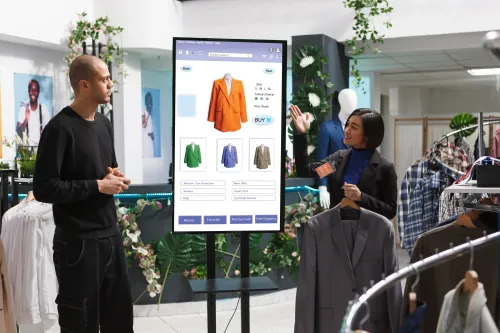
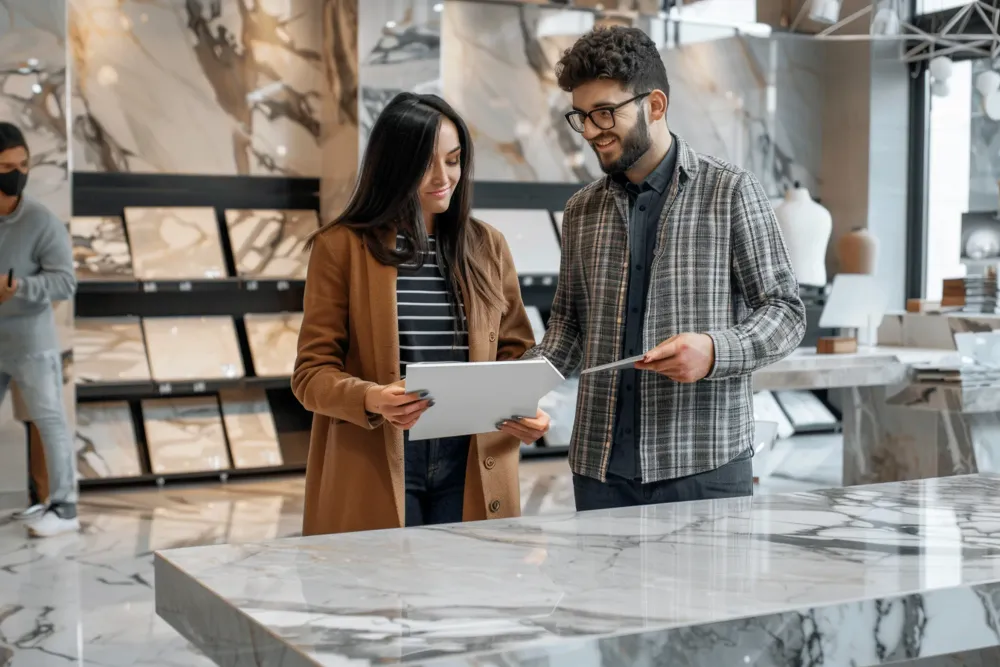
8 Ways AI is Revolutionizing Hyper-Personalization for Luxury Shoppers






Luxury shoppers today expect experiences that feel entirely made for them. They want brands to understand their tastes, moods, and lifestyles without asking twice.
As competition rises and digital interactions increase, luxury brands can no longer rely on standard personalization. Hyper-personalization has become essential for building emotional connection, long-term loyalty, and memorable moments that justify premium value.
Hyper-personalization uses advanced data and AI to understand each luxury shopper more deeply. It goes beyond name-based personalization, creating tailored product suggestions, custom style edits, unique content, and immersive interactions. It delivers experiences that feel curated, relevant, and emotionally aligned with individual desires in real time.
This blog explains hyper-personalization, why luxury brands need it, the implementation roadmap, common challenges, and future trends shaping next-generation premium shopping experiences.
Hyper-personalization is changing how luxury brands connect with their customers. It goes beyond traditional retail strategies by using AI and data analytics to understand individual shopping habits, preferences, and lifestyles. With these insights, brands can offer unique experiences tailored to each person—whether it’s customized product recommendations, exclusive previews, or personalized services. This creates a deeper connection with shoppers and reinforces the exclusivity of luxury products.
Shopping today is no longer just about purchasing high-end goods. Customers expect brands to recognize their preferences and make them feel valued. Hyper-personalization allows brands to design experiences that feel personal, whether online or in-store. From special invitations to targeted content, every interaction becomes more meaningful when it aligns with a shopper’s unique tastes.
Luxury brands worldwide see substantial growth opportunities, especially in India, the Middle East, and Asia. With inflation easing in key markets, more consumers are willing to invest in luxury, particularly in the sub-£500 range. Now is the right time for brands to focus on personalization to build lasting customer relationships.
Consumer expectations are also evolving. A report by BCG & Altagamma found that 72% of luxury shoppers prefer personalized experiences. Among them, 39% of older consumers prioritize personalized in-store service, while 26% find targeted recommendations essential for digital shopping.
With more shoppers turning to digital platforms, luxury brands are rethinking how they connect with their customers. Many focus on social selling and creating seamless experiences across online and offline channels. It’s no longer just about offering high-end products—what truly sets brands apart is how well they personalize each interaction.
Traditional personalization focuses on basic elements such as using a customer's name or suggesting items based on broad categories. It treats shoppers as segments rather than individuals. Hyper-personalization goes much deeper.
Hyper-personalization combines first-party data, real-time behavior, preferences, style patterns, mood signals, and contextual cues to create experiences that feel unique.
Rather than pushing generic recommendations, it delivers bespoke journeys that reflect personal identity. Hyper-personalization mirrors the attention and care offered by in-person luxury advisors and extends it across all digital and physical touchpoints. It aims to make every interaction feel meaningful.
VIP shoppers expect service that anticipates needs before they are voiced. They look for curated product selections, faster access to new collections, and exclusive experiences.
Hyper personalization helps brands offer elevated moments that match the intimacy of private client advisors at scale.
Luxury brands thrive on distinction and emotional connection. Hyper personalization strengthens this identity by creating memorable interactions that reflect personal taste.
It enhances storytelling, deepens loyalty, and maintains a sense of exclusivity that sets premium brands apart from accessible fashion and mass retail players.
Luxury shopping is scurrying toward digital experiences. Customers interact through apps, social platforms, and virtual boutiques.
Hyper personalization ensures these digital journeys remain intimate and human. It fills the gap between physical luxury service and online convenience through tailored suggestions and immersive engagement.
In luxury shopping, AI-powered personalization helps brands connect better with customers, increase sales, and stay ahead of the competition.
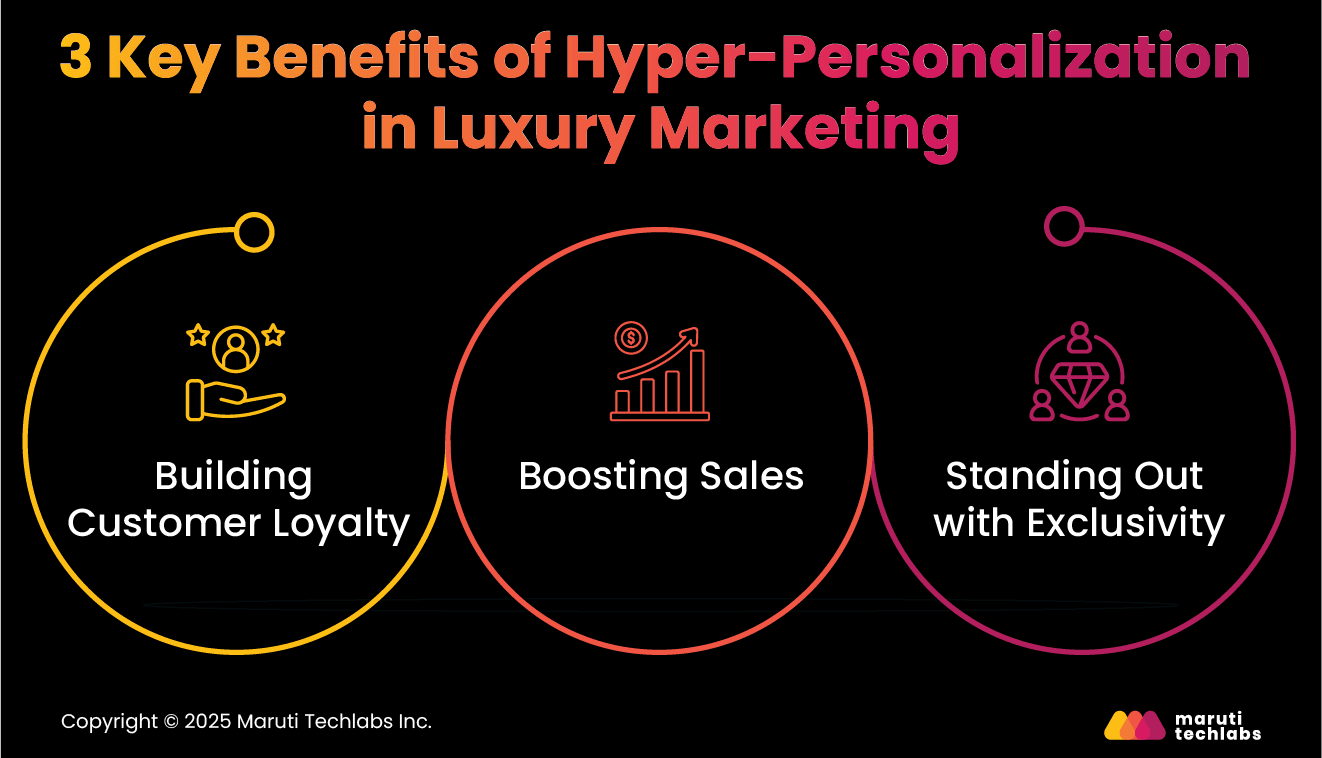
Let’s explore in detail:
Personalized experiences help luxury brands build a stronger emotional bond with their customers. When a brand understands a shopper’s likes and needs, it creates a unique and exclusive feeling that appeals to high-end buyers. This level of personalization makes customers happy and keeps them coming back. People are likely to stay loyal to brands that consistently offer experiences tailored to their tastes.
Personalized shopping experiences lead to more purchases. AI tools analyze customer preferences and show products they’re more likely to buy, making shopping effortless.
For example, Net-a-Porter’s AI-driven recommendations helped increase sales by 35%. When shoppers see exactly what they want, they’re more likely to buy.
In the highly competitive luxury market, personalization gives brands a powerful way to set themselves apart and build deeper connections with their customers. Luxury brands can make each customer feel special by offering exclusive perks, tailored recommendations, and carefully curated shopping experiences. When shoppers receive personalized attention that matches their tastes and preferences, it creates a sense of exclusivity that keeps them engaged.
Luxury brands are embracing AI to create deeper connections with VIP shoppers. From personalized shopping experiences to sustainability initiatives, AI is transforming the luxury market in many ways. Here are some of the key innovations shaping the future of luxury retail:
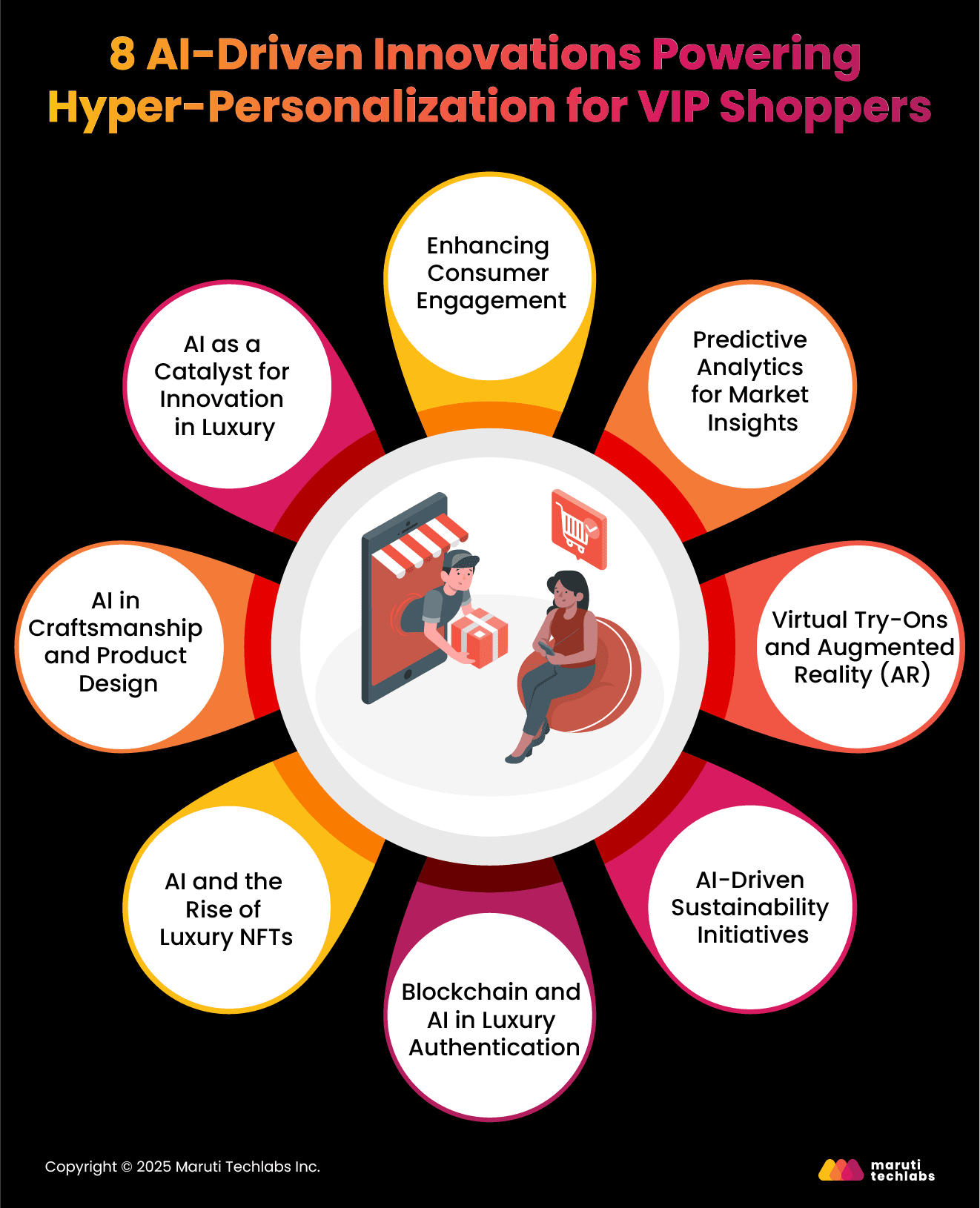
Luxury brands have always focused on creating exclusive and personalized experiences for their customers. AI is now taking this to a whole new level. By analyzing data from purchase history, browsing behavior, and social media interactions, AI helps brands provide highly tailored recommendations and services.
For example, Gucci and Louis Vuitton use AI to predict customer preferences based on past interactions. AI-powered chatbots offer personalized assistance, answering queries and suggesting products in real-time. AI personal shoppers also guide affluent customers to products that align with their tastes and lifestyles, making luxury shopping more refined and engaging.
Luxury brands need to stay ahead of trends and understand VIP shoppers' preferences. AI helps by analyzing vast amounts of data to predict future trends, consumer behavior, and inventory needs. This allows brands to stock the right products at the right time, reducing waste and improving efficiency.
Chanel, for instance, uses predictive analytics to anticipate fashion trends and optimize inventory management. This ensures that their collections align with customer expectations while supporting sustainability efforts by preventing overproduction.
AI-powered augmented reality is changing the way customers shop for luxury goods. Virtual try-ons allow VIP shoppers to see how clothing, accessories, or beauty products will look before making a purchase. This makes online shopping more interactive and reduces the risk of returns.
Burberry and Gucci offer AR apps where customers can virtually try on handbags, watches, or sunglasses. These applications use AI to provide real-time suggestions based on customer preferences, creating a more engaging and immersive shopping experience.
Luxury brands are increasingly focusing on sustainability, and AI plays a crucial role in reducing waste and improving efficiency. AI optimizes supply chains, helps source sustainable materials, and tracks environmental impact.
Stella McCartney, a leader in sustainable fashion, uses AI to monitor supply chains and ensure the ethical sourcing of materials. AI also helps the brand minimize waste during production while maintaining high-quality craftsmanship.
Fake luxury goods have always been a problem. AI and blockchain are making it easier for brands to prove their products' authenticity. AI looks at tiny details like stitching, materials, and serial numbers to check a product's authenticity. Blockchain keeps a digital record of its journey from creation to sale, giving customers more confidence in their purchases.
LVMH, the parent company of Louis Vuitton and Bulgari, has developed AURA, a blockchain-based system that allows customers to verify the authenticity and ownership history of luxury goods. This enhances trust and protects brand reputation.
Luxury brands are exploring digital ownership through NFTs. AI helps create unique digital assets that customers can collect, trade, or use for exclusive brand experiences.
Dolce & Gabbana launched an NFT collection that combined digital artwork with physical couture pieces. AI played a role in designing these exclusive assets, appealing to tech-savvy consumers who value both digital and physical luxury experiences.
Luxury has always been associated with exceptional craftsmanship. AI is now assisting designers in exploring new materials, patterns, and techniques while maintaining brand heritage.
Hermès has experimented with AI tools to develop new fabric patterns and textures for its iconic scarves. This fusion of technology and artistry allows designers to push creative boundaries while preserving traditional craftsmanship.
AI shopping assistants are changing the luxury industry by making shopping more personal, improving sustainability, increasing efficiency, and helping verify real products. Some worry that AI might replace traditional craftsmanship, but when used wisely, it enhances the luxury experience instead of taking away from it.
Luxury brands that use AI can offer more personalized and exclusive experiences while staying true to their high standards. From virtual try-ons to trend prediction, AI is helping luxury brands stay relevant in a fast-changing digital world.
Successful hyper-personalization needs a clear plan that aligns data, technology, and customer journeys.
This roadmap helps luxury brands build systems that feel personal, intuitive, and emotionally rich, while ensuring the experience remains consistent across digital and physical touchpoints.
Gather data from purchases, browsing, wish lists, client advisor notes, and loyalty programs. Create detailed VIP profiles that capture preferences, fit information, past interactions, and lifestyle insights.
This foundation allows AI models to understand each shopper fully and deliver recommendations that feel tailored and emotionally relevant.
Map the journey for each type of VIP shopper. Understand key moments, including discovery, evaluation, purchase, and post-purchase engagement.
Decide how personalization should appear in each stage, from curated edits to exclusive previews. A clear strategy ensures consistent and meaningful experiences across channels.
Select AI solutions that match brand goals. Recommendation engines highlight relevant products. Virtual try on offers immersive discovery. Content personalization adjusts visuals and messaging for each shopper.
Choose tools that integrate smoothly with existing systems and deliver accuracy without compromising the emotional feel expected in luxury.
Ensure personalization flows naturally across every touchpoint. Connect online profiles with in-store advisors. Link app activity with website behavior.
Sync loyalty data with showroom visits. Consistent integration allows shoppers to feel recognized everywhere and gives brands a unified view of preferences and needs.
Track metrics such as engagement, conversion lift, average order value, retention, and satisfaction. Evaluate the quality of recommendations, response times, and in-store interactions.
Use insights to refine models and improve experiences. Iteration helps maintain accuracy and emotional value as preferences change over time.
Hyper-personalization can elevate luxury brands, but also introduces risks if executed poorly.
These challenges must be understood and addressed early to protect trust, maintain exclusivity, and ensure experiences remain elegant rather than intrusive.
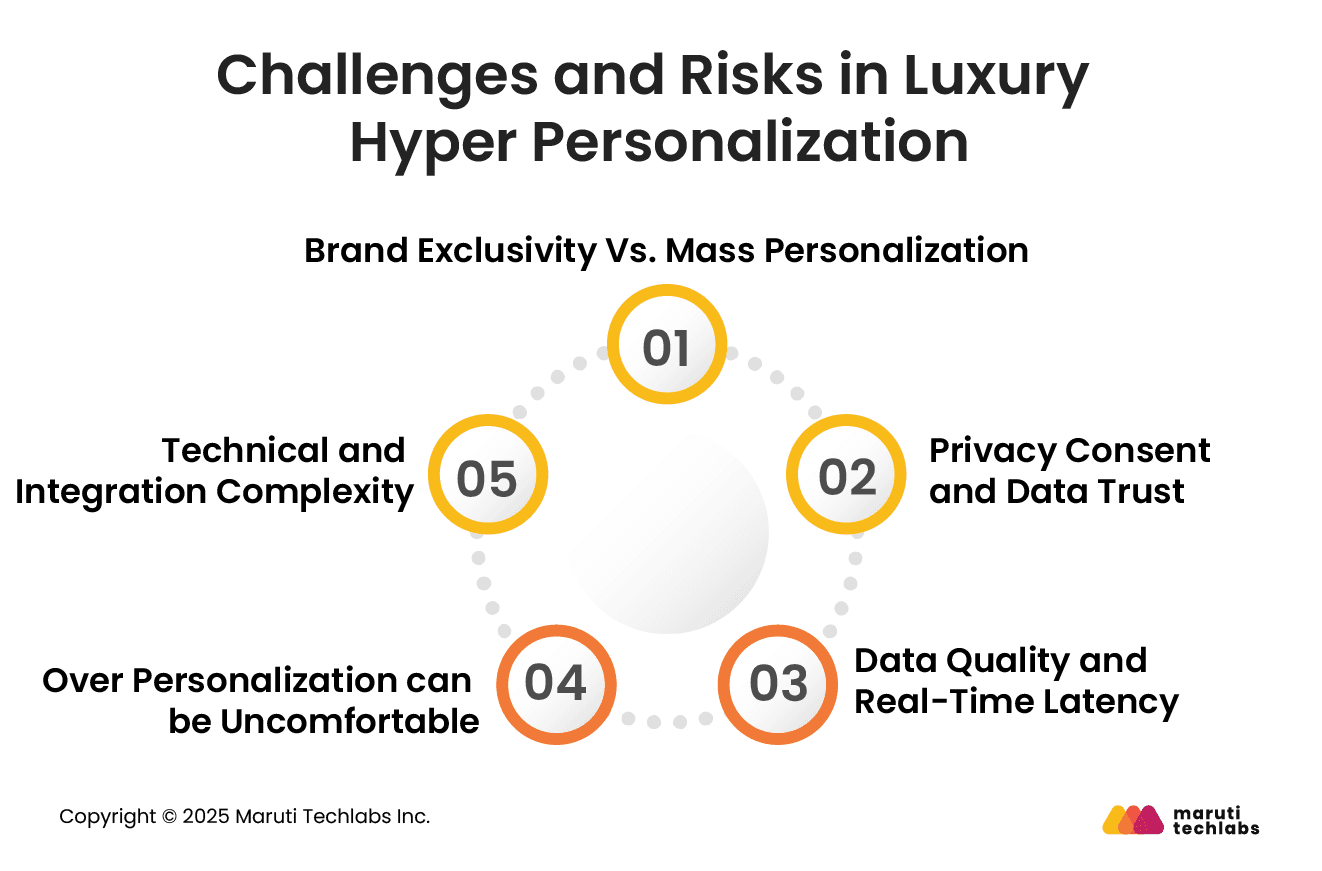
Luxury brands risk losing exclusivity if personalization feels automated or similar for everyone. A premium audience expects emotional depth and carefully curated experiences. Mass scale personalization may dilute the rare and unique feel that defines luxury and could harm brand perception over time.
Limit personalized content volume, highlight exclusivity cues, add human advisor involvement, and use AI only to enhance unique moments rather than replacing couture-level intimacy.
Shoppers share sensitive information when expecting hyper personalized service. If brands misuse data or appear careless, trust will erode quickly. Privacy regulations add further pressure.
Luxury brands must ensure transparent communication, consent-based collection, and strict controls to uphold confidence and protect emotional relationships.
Use clear consent flows, store data securely, communicate usage openly, and offer easy preference controls to build long-term confidence and prevent mistrust.
Poor data quality leads to irrelevant suggestions that break the luxury experience. Delayed updates also create inconsistencies between digital and in-store interactions.
Hyper-personalization relies on real-time signals and clean information to keep recommendations accurate and emotionally aligned.
Automate data cleaning, refresh profiles frequently, and use real time pipelines to ensure accuracy and consistency across all touchpoints.
Excessive tailoring can make shoppers uncomfortable. When AI appears to know too much or predicts preferences too deeply, it may cause a sense of intrusion.
Maintaining emotional comfort is critical to preserving the sense of trust expected in luxury relationships.
Use soft personalization, avoid intimate assumptions, and create boundaries around sensitive insights to protect shopper comfort and maintain elegance.
Integrating AI systems across stores, apps, websites, and advisor tools can be challenging. Legacy systems, disconnected data sources, and interoperability issues often slow progress.
Luxury brands need smooth connections to maintain a unified and elegant customer experience.
Adopt flexible architectures, use unified profiles, and plan phased integration to reduce complexity and maintain consistent experiences.
Implementing AI in luxury retail requires the right combination of people, processes, data, and technology. Here is how brands can begin their journey:
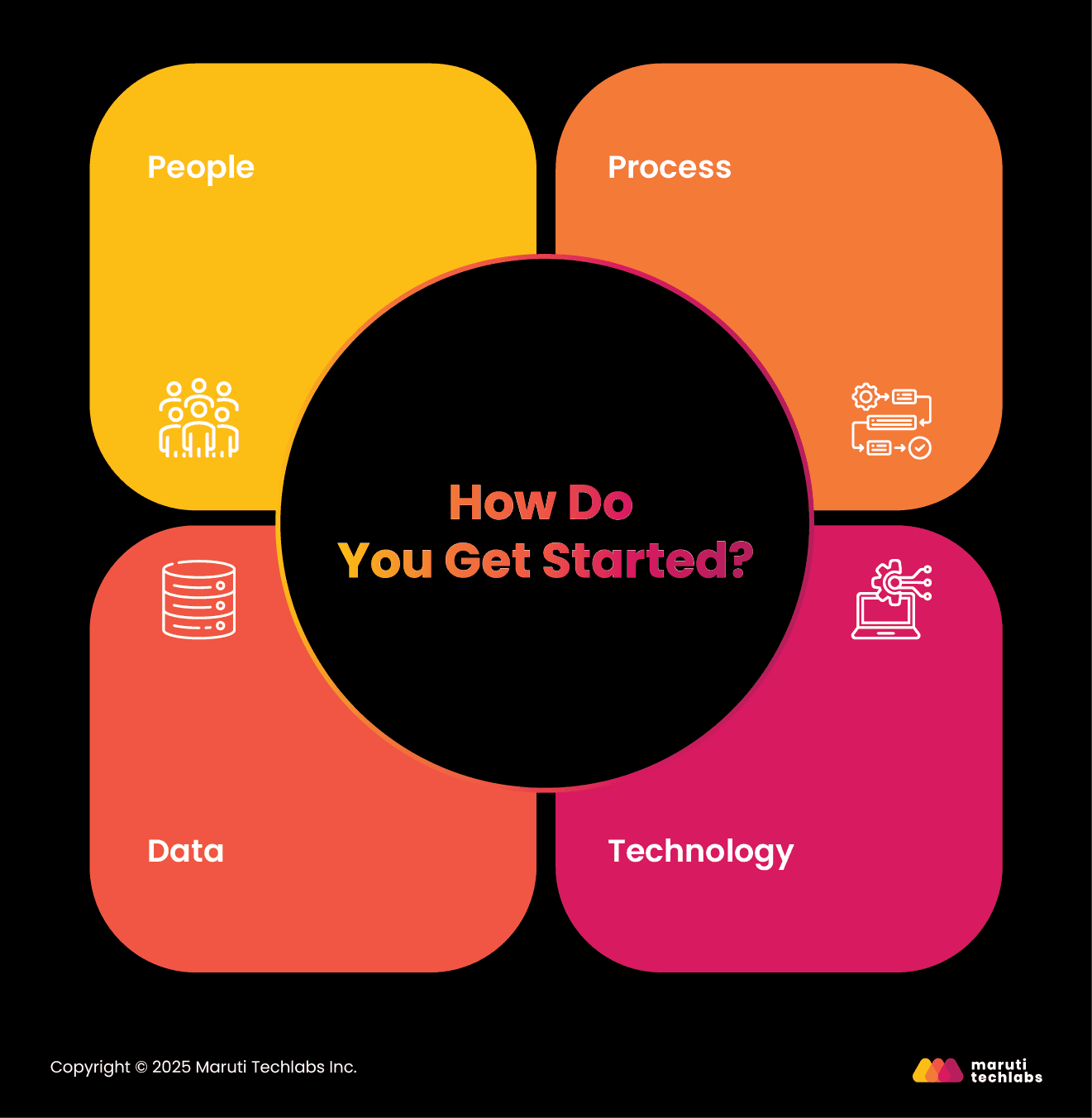
By focusing on these elements, luxury brands can successfully integrate AI and offer an even more personalized, seamless, and engaging shopping experience for their VIP customers.
The next wave of AI innovation will further transform luxury personalization.
These trends will create richer, more emotional, and more interactive experiences that strengthen brand identity while staying aligned with evolving expectations of premium shoppers.
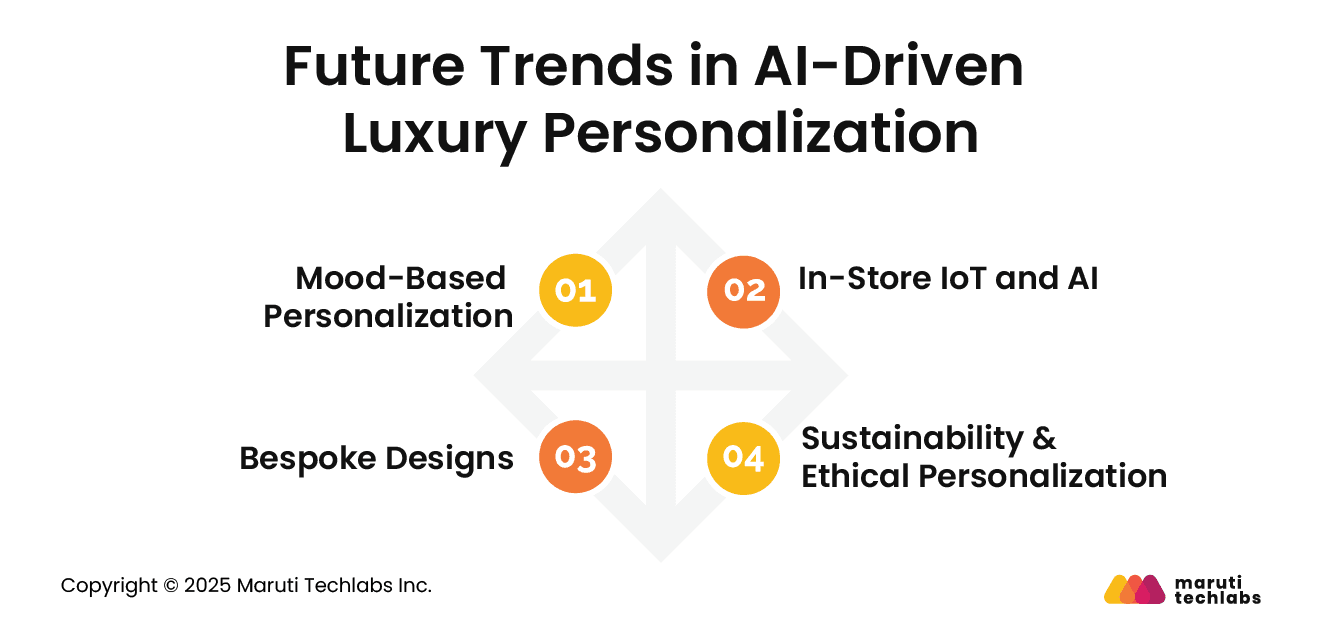
AI models will analyze browsing patterns, tone of interactions, and real-time signals to understand shopper mood.
This allows brands to recommend styles, colors, and experiences that match emotional states. Mood-aligned recommendations will create a deeper connection and make you feel closer to the attention you receive from human stylists.
Connected devices will allow stores to recognize returning shoppers and deliver tailored experiences instantly.
Smart displays, personalized fitting rooms, and AI-assisted client advisors will create in-store journeys that adapt in real time, making shopping feel intuitive, warm, and deeply personal.
AI will help shoppers create their own bespoke designs by generating variations of colors, materials and shapes based on personal taste.
This gives clients greater creative control and strengthens emotional ownership. Co-creation blends couture craftsmanship with modern innovation.
AI will match customers with sustainable options that align with personal style. It will encourage mindful luxury by highlighting responsible materials, low-impact choices, and ethical craftsmanship. This enhances brand value and aligns with the growing desire for responsible and conscious buying behavior.
Tailored experiences are the future of luxury shopping. Customers no longer settle for generic interactions; they expect brands to understand their unique preferences and deliver highly personalized experiences. AI and data analytics make this possible at scale, helping brands anticipate desires, enhance engagement, and build lasting relationships.
Now is the time to act. Luxury brands integrating AI into their customer journey can differentiate themselves, improve customer loyalty, and stay ahead in a competitive market. Investing in AI-powered personalization isn't just about keeping up; it's about leading the future of luxury retail.
At Maruti Techlabs, we help brands unlock AI-driven hyper-personalization to create seamless, engaging experiences for their VIP customers. Contact us to explore how our AI solutions can elevate your brand.
Curious how ready your brand is to adopt AI? Try our AI Readiness Assessment Tool to find out where you stand and how to move forward confidently.


